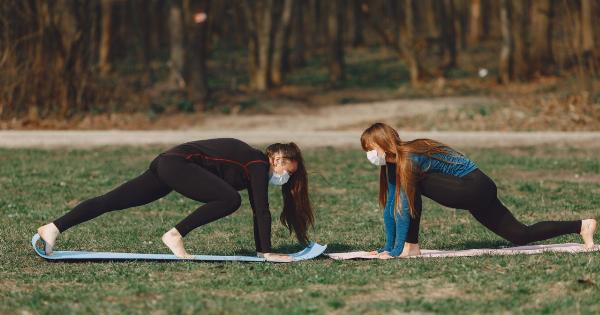Sleep is essential to maintaining good health. It boosts your immune system, helps with weight management, and improves mental clarity. Unfortunately, for many people, a good night’s rest is hard to come by.
Insomnia affects more than 30% of adults and can have a significant negative impact on one’s quality of life. If you are among those who struggle to fall and stay asleep, natural solutions are here to the rescue.
Understand the Body’s Sleep Cycle
Before we explore natural solutions to sleep problems, it’s helpful to understand how our bodies regulate sleep. The sleep cycle is the progression of stages that occur when we fall asleep and continue to rest.
These stages can be categorized by the speed of brain waves and muscle activity. The varying stages are as follows:.
- Stage 1 (Transition to sleep) – the phase where you start to drift off but can still be easily awakened.
- Stage 2 (Light sleep) – the body’s core temperature decreases, eye movement stops, and breathing and heart rate become regular and slow down. The body prepares to go into a deep sleep.
- Stage 3 (Deep sleep) – known as the slow-wave or delta phase, the body completes essential repairs, muscle tissue growth, and regeneration during this stage.
- Stage 4 (REM sleep) – during Rapid Eye Movement (REM) sleep, the muscles are paralyzed, and the brainwave activity becomes similar to that of someone awake. The mind and body are active, and dreams occur.
The sleep cycle repeats every 90-120 minutes, and It’s essential to experience all four stages to wake feeling refreshed. However, conditions like sleep apnea can disrupt breathing and cause daily interruptions.
Nightmares and sleepwalking can appear as a result of stress or trauma.
Establish a Steady Routine
Consistency is key to a good night’s rest. An established routine will help your body food for sleep and rest efficiently. Designing a routine that suits your work, life responsibilities, and family obligations is possible. Here are a few tips:.
- Try to wake at the same time each day, even on the weekends. Your body will learn to wake naturally without an alarm clock.
- Wind down before bed, calming activities such as reading, taking a warm bath, or listening to music can assist with relaxation.
- Avoid those stimulating activities just before bed, like scrolling through social media or binge-watching a Netflix series.
- Avoid caffeine and alcohol from the late afternoon onwards. Taking stimulants before bed might keep you awake and could affect your ability to stay asleep.
Create a Relaxing Sleep Environment
The bedroom needs to be a relaxing haven where the mind and body can relax. Taking the time to design a sleep environment that is comfortable, calm, and quiet is essential to good sleep hygiene.
Some tips for creating a relaxing sleep environment include:.
- Use good quality bedding, choosing natural fabrics that promote airflow and keeping the bed cool may help too.
- Lower the light levels, too much light during sleep could harm your quality of rest, try blackout curtains, eye masks, or avoiding bright screens for at least an hour before bed.
- Try a white noise machine to help block out any traffic or loud neighbors. The gentle sound could be soothing.
- Keep it cool, the optimal temperature to help drift asleep is typically between 60-67°F, so ensure you cool your bedroom before sleep
Unwind through Mindfulness and Relaxation
Relaxation and mindfulness are excellent for destressing and calming the mind. Activities like yoga, meditation, and deep breathing gradually slow the body down and help regulate breathing and heart rate.
Consistent mindfulness practices can benefit sleep hygiene. Here are some tips you could try yourself:.
- Incorporate deep breathing techniques into your routine.
- Try an online or in-person yoga class.
- Listen to a guided meditation before bed or download a mindfulness app like Headspace or Calm.
- Try some aromatherapy by using scented candles with natural herbs and fragrances like lavender, jasmine, or bergamot.
Herbs and Supplements
Many natural remedies and supplements can promote better sleep patterns. Herbs and supplements are best used as a complementary therapy, carefully and appropriately prescribed by a healthcare provider. Here are some of the popular options:.
- Valerian Root – Many believe Valerian root helps to influence the body’s ability to enter deep sleep, reducing night time wakefulness.
- Chamomile – Chamomile tea is popular for calming and relaxing properties. It has been used for generations as a natural remedy to encourage restful sleep.
- Melatonin Supplements – Melatonin intake can assist in maintaining natural sleep cycles, especially when jet-lagged or working long hours.
Natural Supplements for Better Sleep
Natural sleep supplements are perfect for those seeking to avoid harsh sleep medication or prescriptions such as Ambien. These supplements should not diagnose, treat, or cure any underlying conditions, and should be used as directed.
Here are some great natural sleep aids that could help:.
- L-theanine – An amino acid known for promoting relaxation without making you drowsy.
- L-Tryptophan – A specific type of amino acid can alter the amount and quality of serotonin that the brain produces and help relieve tension and stress.
- 5-HTP – A natural neurotransmitter that converts into serotonin and aids in regulating sleep-wake cycles and supporting healthy sleep.
Conclusion
Getting enough sleep is essential for maintaining good health and well-being. It protects against illnesses, helps promote a healthy weight, and provides the body with the energy and clarity needed for daily functions.
Incorporating natural solutions, establishing a routine, and creating a stress-reducing environment can give you the best chance of a good night’s rest. While these methods can be helpful, always discuss any potential interventions with a medical professional.






























